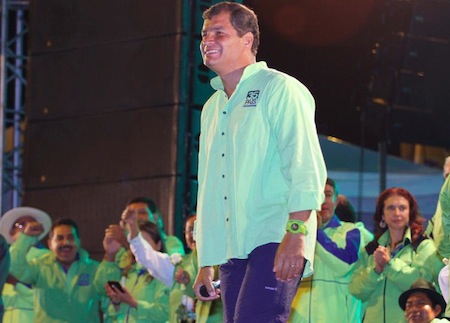It’s probably one of the least unexpected victories of world politics this year, but Rafael Correa has won reelection as Ecuador’s president, extending Correa’s term in office through 2017.![]()
According to exit polls, Correa ultimately won 61.5% of the vote, thereby avoiding an April 7 runoff, just as he did in his quest to win a second term — Correa was the first Ecuadorian presidential candidate to avoid a runoff in 2009 in the 30 years of modern Ecuadorian elections since the end of military rule in 1979.
Correa has already declared victory.
In fact, it’s the highest first-round total of any election since 1979 in Ecuador, and Correa’s reelection means he will have served a longer consecutive term than any Ecuadorian leader since Ignacio de Veintemilla, president from 1876 to 1883 and, in five months, Correa will become Ecuador’s longest-serving consecutive leader since independence from Spain. José María Velasco Ibarra ultimately served over 11 years as Ecuador’s president in four stints between 1934 and 1972.
For more thoughts on what this means for Latin America, the future of the Latin American populist left and Ecuador’s politics and economy, read my piece from last week outlining five key take-aways from today’s election.
The runner-up, Guillermo Lasso, a banker and former president of the Banco de Guayaquil, finished a distant second with just 20.9% of the vote.
Lucio Gutiérrez, a former president from 2003 until massive protests forced his ouster in 2005, won just 6.0, and Álvaro Noboa, one of Ecuador’s wealthiest businessmen and who finished first place in the first round of the 2006 election that Correa ultimately won, won just 3.5%. Alberto Acosta, Correa’s former oil and mining minister and co-founder of the Alianza PAIS, won 2.9%.
In separate parliamentary elections held today, it is expected that Correa’s ruling Movimiento Patria Altiva i Soberana or Alianza PAIS (Proud and Sovereign Fatherland, or ‘PAIS’) will win a majority in the 137-seat, unicameral Asamblea Nacional (National Assembly).
